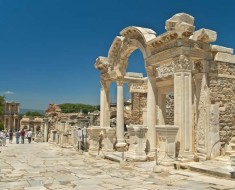Acts 2:1-21
John 14:8-17,25-27
One of the more remarkable things about the present supposedly secular age is the fascination people have in the supernatural.
No supreme and benevolent God it seems for many people, and yet videos, TV series, films, novels and video games that mostly involve chasing and killing people or monsters, and point in the direction of mystery and irrationality, sometimes of the most threatening and violent kind. An example of that is a series of books popular with older children at the moment – and films that have spun off from them – about intergalactic vampires. People keep changing into them and nourishing themselves on the blood of their victims. Great fun, I am told.
There seems to be a fascination in primitive, medieval, far-away days, although people who believed in evil spirits and were afraid of Satan in the 1300’s were also people who believed that the powers of goodness could be triumphant.
I don’t criticise the popularity of this strange contemporary fascination in the supernatural, though don’t share it, for although they may not know it, people are acknowledging how it is with human beings. Strangeness other-worldliness is part of our being. Rationality is worth working at, but there are extra-sensory realities as well that belong to and inform our human experience.
You can’t get a much stranger event than what we call Pentecost’ – the culmination of the Jesus story- taking us into the realms of sublime oddness ; so much so that all the apostles can do as they are overwhelmed with a sense or divine otherness, is to babble like children who have yet to learn the coherence of speech.
This is the primitive language of sound alone: a release from order and intellect into a temporary world of corporate bliss. Christian enthusiasts who today claim to speak in tongues say they have a similar experience – indeed covert it, and claim a special disinrtinction because of it.
And yet, strange, other-worldly, out of normal experience the coming of the Spirit may be – here, as St. John has it, early in Jesus’ ministry there is a rather different promise. The Holy Spirit is a friend, an advocate, someone speaking up for me, who will be a reminder of the teaching and activity of Jesus. I love that little phrase – forgetful as we may be of many things but more especially where we are in the Christian journey and the spiritual luggage we carry with us – ‘the Holy Spirit will remind you’. And we often need reminding.
But back to that upper room. They were possessed, taken over, by the ‘flow’ of the Spirit. The idea of flow is a helpful one. These elemental images of the coming of the Spirit are wind, river and fire. They all flow, as terrified people in the wake of a forest fire might discover, or a river in flood, or the hot wind of the desert. Nothing can stop it, as these amazed founders of the Church discovered in their delirious moment where body and mind surrendered to naked power; nothing could stop the inrush of the Spirit of God.
Peter and his friends were thought to be drunk, so bizarre is their behaviour. In fact no group of a dozen people could have been more clear-headed. It could be said of the Christian Church – when you think of how later it was to develop the habit of setting out in all sorts of different directions – was never as sober as it was on the first Whit Sunday. For this splendid epoch-making moment, it was totally focused.
The sharpness of the apostolic focus becomes clear when we read to the end of Peter’s sermon as experience moves on to explanation. All that he has previously said, including his denial that he and his friends are drunk, leads to this precise conclusion in which he summarises the Christian gospel by comparing the prophesies of King David to the achievements of Jesus. ‘Therefore’ he thunders to the crowd that gathered to witness this strange moment, ‘let the whole house of Israel know with certainty that God has made him both Lord and Messiah, this Jesus who you crucified’.
A wild out-of normal moment that concludes in a firm statement of accusation and affirmation. You can imagine the discomfort of the listeners ‘Who crucified him? We didn’t… .Don’t blame me. It was the priests and the Pharisees in their unholy alliance; it was the Roman governor…. I was selling in the market when it happened. ..But now this odd goings on with one of Jesus’ friends so sure of everything’. And out of this moment, the church was born.
Nothing comparable has happened to us as we sit well behaved in church and hear the story again. We celebrate it as we do all the great Christian festivals, with its opportunity to say in our prayers what we desire, what we would like to be which at present we are not. When we say ‘come Holy Spirit, come’ what are we asking for? Much of it may be expressed in the six verses of a hymn by the nineteenth century American pastor and poet, Samuel Longfellow, expressing what we may want for ourselves and what we desire to be for others. Perhaps influenced by the letter to the Galatians where Paul suggests that there are nine ‘fruits of the Spirit’, Longfellow hymn addresses the Spirit and in the process identifies her gifts, all of them ‘divine’. Let’s look at them.
Truth. . By the gift of God we have a faith which leaves us humble not proud, open to new understanding and not enclosed in a culture of cynicism such as pervades the public and media life of the age we are living through. Integrity is one of the greatest marks of the Christian. We are what we say we are. Jesus: the way he lived and the God he believed in, is our truth. God is Lord of all; and my Lord. ‘Come to us, Spirit of truth’.
Love – a much used and often abused word. It has become almost a mantra, a way to sign off a conversation or end a message on Twitter, of Facebook: people say, ‘Love you’. That’s good. Led by the Spirit we enter into all sorts of places and situations, not to get love (though it’s welcome when it comes) but to give love. If someone said of your church, ‘what’s it like?’ after a bit of thought you might say, ‘we care for each other’. And the after remembering the charities your church supports and the wider community you wish to be part of, you might add’ we are learning to love others too.’ ‘Come to us, Spirit of love’.
Power How often we say – especially through this winter that almost robbed us of spring ,’ Gosh I’m tired. Can’t think why. …It’s a long time since I ran up stairs and I’m not taking the dog for long walks, and yet I’ve got so little energy….My agenda gets longer by the day and I’m always behind with my work. The God of all enthusiasm keeps most of us going but we often lack staying power, power for the extra mile, power to get us to church and power to be the church, power to say our prayers, power to think more about tomorrow rather than yesterday. ‘Come to us, Spirit of power’.
Right Morality can be a dull, dutiful, sober word; a bit off-putting. Suddenly a member of parliament has rediscovered it. The formidable Margaret Hodge is chair of the Public Accounts Committee, which has been examining the tax evasions of major, international companies. ‘It’s not a question of legality’ she frequently says, ‘but morality’. A woman said to me on the bus the other day- . ‘Oh the language on TV!’ – and much else, we could have added, reveals the darker side of humanity. Simple dignity of life has surrendered to shock and sensationalism. Morality needs to be recovered as an honourable word and an important intention. ‘Come to us, Spirit of purity’.
Peace Oh for more of it in our hearts, in our divided nation, in the world! How we long for an end to enmity and conflict and the beginning of a gentle and hopeful regard for brother and sister in community. There are no easy solutions to ending human discord and brutality and the tensions of ethnicity and difference. Here more than anywhere else, nature reaches its limitations and we pray for supernatural guidance. ‘Come to us, Spirit of peace’.
Joy – the bubbly sort that keeps on emerging from the ground of our being like the famous waters on which the City in which we live are founded. Not superficial, not self-endused (‘I must appear to be happy because that what Christians are’), not turned on when in the company of non-Christians to show what they are missing. The joy coming from deep down within us. ‘Come to us, Spirit of joyfulness’.
There is a power that is more than me or us. Strange, out of another world and into ours, the ‘Comforter’ as we say. Some traditions indeed call the Spirit, ‘She’. There is a tradition in the Eastern Orthodox Church that calls the Spirit ‘mother’; influenced perhaps by the Hebrew word for spirit, ruach, which is feminine.; an influence that reduces the spookiness of what happened in the upper room so that it becomes friendly and for our good, flowing from the source of all that is good. Like wind, and fire, and water. She (he) reminding us of who we are and what we are for. Reminding us of Jesus, as he promised, – his words, his plan and his promise. So be it.





